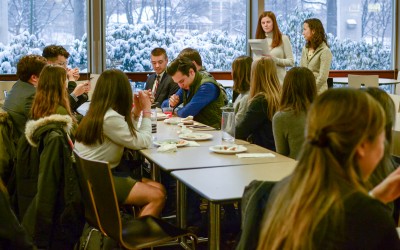
The Boston University Student Government Executive Board elections, held from March 28 until Sunday, saw a slight increase of voting turnout in comparison to the 2015 election, members of the Student Elections Commission said.
During this year’s election, 2,717 out of 16,496 BU undergraduate students voted, which is slightly more than last year’s 2,633 votes that The Daily Free Press reported Apr. 16, 2015.
SEC Chair Grace Cusick said despite the difficulty in promoting voting turnout, this year’s election saw a fair process.
“A lot of slates are very passionate, as they should be,” said Cusick, a sophomore in the College of Arts and Sciences. “[The SEC was] dealing with a lot of different emotions, and our whole staff handled that really well. They were really unbiased and really strong.”
Cusick said she hopes the BU administration can promote SG elections through official channels in the future, in hopes of increasing the voting turnout and student awareness of SG.
“We definitely would like to have our deans, President [Robert] Brown and a lot of the higher-ups [in the administration] promote the election through social media,” Cusick said. “That would be a big platform for us.”
Jake Brewer, the Clean Slate candidate for president, won this year’s elections after garnering 1,067 votes, according to data presented Monday at the Announcement Dinner. The other three E-board positions went to Clean Slate’s SaraAnn Kurkul as the executive vice president-elect, Clean Slate’s Jane Dimnwaobi as the VP of internal affairs-elect, and BU Recharged’s Justin Flynn as the VP of finance-elect, as was confirmed at the Announcement Dinner.
Brewer and BU Recharged’s Louis Vitti were initially in a tie for the president position. However, Vitti decided early Tuesday morning to withdraw from the planned runoff election that would have started Tuesday at noon, The Daily Free Press reported Tuesday.
Vitti, a junior in the Questrom School of Business, was unavailable to comment.
Brewer, junior in CAS, said his plan for SG includes reforming the bureaucratic structure, adding cultural groups’ representation in Senate and advocating for BU adjunct professors’ rights.
“I’m going to Senate next week with a proposal [to form a] lower house, which is comprised of every undergraduate student of BU,” Brewer said. “[Whenever] there is a vote on something in SG, it will first go through a town hall-type system, where the student body votes on an issue — either for or against.”
A matter would only be voted by the upper house, which would comprise of the current Senate, if the lower house’s votes fail to represent at least 10 percent of the student body, Brewer explained.
Brewer also said BU adjunct professors deserve a conversation with the BU administration to negotiate matters such as wages and contracts, and SG will represent the student body’s will on this matter.
“We’re talking with [adjunct professors] right now,” Brewer said. “We have been talking to them throughout the campaign.”
Several candidates who ran for SG but did not receive E-board seats said they gained an invaluable learning experience from the election process.
NewBU’s presidential candidate, Nadia Asif, said she appreciated the experience, and she will continue to advocate for the causes she promised during the campaign.
“I got to know … great student leaders, great minds, people who I would want to work with in the future regardless of whether they are in SG or not,” said Asif, a sophomore at the College of Engineering. “There’s a lot that an individual student can accomplish on their own. I don’t think you need to be affiliated with SG to get a lot of stuff done.”
Clean Slate’s candidate for VP of finance, Hanaan Yazdi, said she is proud of the members of her slate who won seats on the E-board, but she wishes future elections would have more debates.
“[Clean Slate] did a lot of outreach, which really affected the voter turnout,” said Yazdi, a sophomore in CAS. “[The election process] was mostly good. I do wish there was more opportunity for the slates to sit down and discuss specifics about their policy.”
BU Recharged’s candidate for VP of internal affairs, Anai Sanchez Riveron, said she enjoyed the whole campaign and election process, and she plans to continue her involvement in student organizations.
“I love campaigning, I love the process, I love my team,” said Sanchez Riveron, a junior in the College of Communication. “Even though it was kind of stressful, I won’t regret it. I learned so much.”
Several students said they did not vote during the SG election because they had doubts of what SG is actually able to achieve.
Lily Pham, a freshman in the School of Education, said she has not been following SG events, and she is unsure if SG can make a difference in the university.
“I heard about the elections going on, but I don’t really know anything about the elections,” Pham said. “Honestly, I don’t know if I have any specific hopes for SG, because I haven’t heard anything from SG this year. I don’t know if Student Government makes a big difference.”
Aidan Rose, a junior in ENG, said there are a few issues he is concerned about with the university, but he did not vote during the election because he was not sure if SG has the capability to address these issues.
“I got an email about [the elections], but that’s about it,” Rose said. “I know SG and the election exist. For many things I have issues with within BU, there [are] not many that they can take care [of].”




















































































































